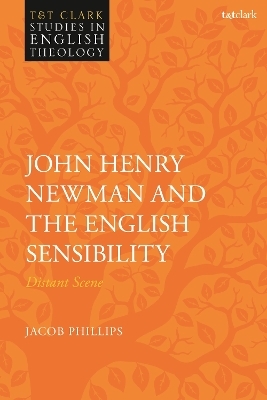
John Henry Newman and the English Sensibility
Distant Scene
Seiten
2024
T.& T.Clark Ltd (Verlag)
978-0-567-70999-8 (ISBN)
T.& T.Clark Ltd (Verlag)
978-0-567-70999-8 (ISBN)
Asides about John Henry Newman being either particularly English or particularly un-English are common. John Henry Newman and the English Sensibility scrutinises Newman’s theological writings to establish how his theology can be considered distinctively English or un-English at the different stages of its development.
In his Tractarian period, Newman’s theology is shown to be profoundly characterised by common 19th-century tropes of a perceived English sensibility, namely an instinct for compromise, an affection for reserve and a markedly empirical orientation to life. In the period following Newman’s conversion to Catholicism in 1845, however, his theology turns against the Englishness of his earlier years as he critiques of the many theological dangers of a self-confident cultural sensibility. In his mature writings, nonetheless, Newman re-incorporates certain elements of his earlier Englishness with a Catholic grounding, yet also maintains an antipathy to certain targets of his post-conversion polemics.
Phillips finds that the English instinct for compromise is not incorporated into Newman’s mature theology, which remains unabashedly one-sided in its understanding of God and the Catholic Church, taking precedence over elements of a cultural sensibility pertaining ultimately to the sphere of the natural. The affection for reserve, however, is shown to be capable of gracious elevation when reconfigured on a Catholic grounding. Most importantly, the profoundly empirical orientation to life which was considered typical of Englishness in Newman’s day emerges as something exhibiting what Newman might consider a ‘antecedent affinity’ to Catholic theology.
This book thus concludes by offering a view of the English Catholic sensibility as characterised by a mindset of careful reserve toward knowledge and words about God, arising from a marked concern for the living, embodied present as the site of God’s transformative action in the twists and turns of human life.
In his Tractarian period, Newman’s theology is shown to be profoundly characterised by common 19th-century tropes of a perceived English sensibility, namely an instinct for compromise, an affection for reserve and a markedly empirical orientation to life. In the period following Newman’s conversion to Catholicism in 1845, however, his theology turns against the Englishness of his earlier years as he critiques of the many theological dangers of a self-confident cultural sensibility. In his mature writings, nonetheless, Newman re-incorporates certain elements of his earlier Englishness with a Catholic grounding, yet also maintains an antipathy to certain targets of his post-conversion polemics.
Phillips finds that the English instinct for compromise is not incorporated into Newman’s mature theology, which remains unabashedly one-sided in its understanding of God and the Catholic Church, taking precedence over elements of a cultural sensibility pertaining ultimately to the sphere of the natural. The affection for reserve, however, is shown to be capable of gracious elevation when reconfigured on a Catholic grounding. Most importantly, the profoundly empirical orientation to life which was considered typical of Englishness in Newman’s day emerges as something exhibiting what Newman might consider a ‘antecedent affinity’ to Catholic theology.
This book thus concludes by offering a view of the English Catholic sensibility as characterised by a mindset of careful reserve toward knowledge and words about God, arising from a marked concern for the living, embodied present as the site of God’s transformative action in the twists and turns of human life.
Jacob Phillips is Director of the Theology Institute at St Mary’s University, UK.
Chapter 1:
John Henry Newman and Englishness
Chapter 2:
The English Sensibility
Chapter 3:
Newman’s Tractarian Compromise
Chapter 4:
Newman’s Tractarian Reserve
Chapter 5:
Newman’s Tractarian Empiricism
Chapter 6:
Compromise in the Second Spring
Chapter 7:
Reserve in the Second Spring
Chapter 8:
Empiricism in the Second Spring
Chapter 9:
Compromise in the Mature Newman
Chapter 10:
Reserve in the Mature Newman
Chapter 11:
Empiricism in the Mature Newman
Conclusion:
Distant Scene
Bibliography
Index
| Erscheinungsdatum | 15.10.2024 |
|---|---|
| Reihe/Serie | T&T Clark Studies in English Theology |
| Verlagsort | Edinburgh |
| Sprache | englisch |
| Maße | 156 x 234 mm |
| Themenwelt | Geschichte ► Teilgebiete der Geschichte ► Religionsgeschichte |
| Religion / Theologie ► Christentum ► Kirchengeschichte | |
| ISBN-10 | 0-567-70999-X / 056770999X |
| ISBN-13 | 978-0-567-70999-8 / 9780567709998 |
| Zustand | Neuware |
| Informationen gemäß Produktsicherheitsverordnung (GPSR) | |
| Haben Sie eine Frage zum Produkt? |
Mehr entdecken
aus dem Bereich
aus dem Bereich
Von den Anfängen bis zur Gegenwart
Buch | Hardcover (2022)
C.H.Beck (Verlag)
CHF 47,60
Herkunft, Blüte, Weg nach Osten
Buch | Hardcover (2024)
C.H.Beck (Verlag)
CHF 55,90


